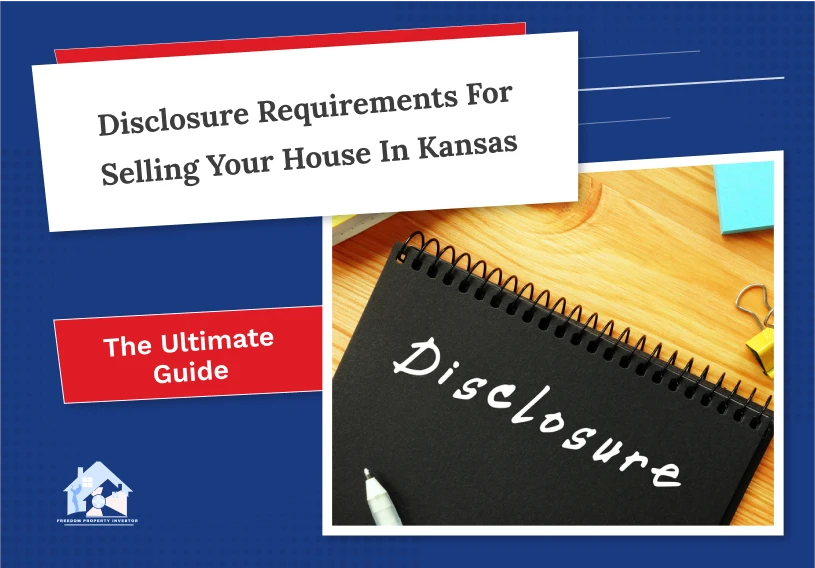
Opting to sell your house in kansas without the guidance of a realtor presents a choice filled with a mix of potential benefits and obstacles. It’s essential to start this journey with a clear understanding of what it entails and whether it’s the right choice for you. A realtor’s primary function is to navigate you through the complex journey of selling your property. Encompassing tasks such as managing paperwork, marketing, negotiation, and more. Conversely, when you choose to sell your house in Kansas without a realtor, these responsibilities fall squarely on your shoulders.
So, is this the suitable route for you? In this guide, we’ll delve into the details of sell your house in Kansas without a realtor, focusing specifically on the essential paperwork you’ll need to manage. By the end of this journey, you’ll have a clearer picture of the steps involved, the required documentation, and whether this DIY approach aligns with your goals and circumstances. Let’s explore the world of sell your house in Kansas without a realtor, starting with the crucial paperwork you’ll need to navigate.

Essential Paperwork: Deed, Disclosure Forms, and More
Selling a house necessitates a significant amount of paperwork, whether you’re collaborating with a realtor or opting for the do-it-yourself approach. When you decide to sell your house in Kansas without a realtor, you become responsible for managing these crucial documents. Here’s a breakdown of the essential paperwork you’ll need to handle:
1. Deed to Your Property:
The deed serves as the legal instrument that conveys ownership of your property to the purchaser. You’ll need to prepare a deed that complies with Kansas state laws and includes all necessary details.
2. Property Disclosure Forms:
In Kansas, sellers are typically required to provide certain disclosures about the property’s condition. These disclosures inform buyers about any known issues, repairs, or potential concerns related to the property.
3. Sales Contract or Purchase Agreement:
This document specifies the terms and conditions of the sale, encompassing the sale price, transaction timeline, and any contingencies. You’ll need to draft a clear and comprehensive contract that both you and the buyer agree upon.
4. Contingency Clauses:
Conditions outlined in the contract as contingencies delineate prerequisites that must be fulfilled for the sale to progress. These can include conditions related to inspections, financing, or other factors. Understanding and negotiating these clauses is crucial.
5. Lead-Based Paint Disclosure (for homes built before 1978):
If your home was built before 1978, federal law requires you to provide a lead-based paint disclosure form to the buyer. This form informs them about any known lead-based paint hazards.
6. Statement of Property Condition:
This document provides a detailed description of the property’s condition and any recent repairs or renovations. It helps buyers make informed decisions about the purchase.
7. Kansas Residential Sales Agreement:
This standard form is often used in Kansas real estate transactions. It covers various aspects of the sale, including financing, inspections, and other important details.
8. Agency Disclosure Form:
If you have worked with any real estate agents during the process. You may need to provide an agency disclosure form to clarify the roles and responsibilities of all parties involved.
9. Seller’s Property Disclosure Statement:
Completing this form obliges you to divulge any acknowledged significant defects or problems associated with the property. It helps buyers assess the condition of the property before finalizing the purchase.
10. Closing Statement (HUD-1 or Closing Disclosure): – This document details all the financial transactions involved in the sale, including the final sale price, closing costs, and the distribution of funds. It’s a critical component of the closing process.

Selling your house in Kansas without a realtor requires a solid grasp of the state’s real estate laws. Here are essential points to consider:
- Kansas Real Estate Laws: Understand the state’s specific laws, like the Kansas Real Estate Brokerage Relationships Act, outlining roles and responsibilities.
- Local Regulations: Comply with local zoning ordinances and homeowners’ association rules that can impact the sale.
- Liabilities: Fulfill legal responsibilities, provide accurate disclosures, and adhere to fair housing laws to avoid potential liabilities.
- Contractual Agreements: Ensure your sales contract aligns with state and federal laws, covering contingencies, financing, and property conditions.
- Closing Process: Navigate the closing process meticulously, including deed transfer and fund distribution, adhering to contract terms.
- Legal Advice: Consider consulting a real estate attorney for guidance and compliance assurance.
- Disclosure Requirements: Disclose known property defects as required by Kansas law to avoid legal consequences.
- Tax Implications: Be aware of potential tax obligations, such as capital gains tax, and seek professional advice when needed.
Property Preparation: Getting Your Home Ready to Sell
Before listing your home for selling your house in Kansas without a realtor, it’s vital to prepare your property to make a favorable impression on potential buyers. A well-prepared home can attract more interest and potentially lead to a quicker sale. Here’s how to get started:
1. Make Necessary Repairs and Improvements:
Attend to evident concerns, such as dripping faucets, electrical issues, or roof deterioration. Repair or replace broken fixtures and appliances. A well-maintained property is more appealing to buyers.
2. Enhance Curb Appeal:
First impressions matter. Enhance your home’s curb appeal by maintaining the lawn, adding floral arrangements, and ensuring the exterior is tidy and welcoming. If necessary, think about applying a fresh coat of paint to the front door and the exterior. Consider a fresh coat of paint for the front door and exterior if needed.
3. Declutter and Depersonalize:
Eliminate personal items such as family photographs and excessive decorations. Simplify your living areas to create the impression of more spacious and inviting rooms. Prospective buyers should be able to envision themselves residing in the property.
4. Clean Thoroughly:
Give your home a deep cleaning, paying attention to every corner, including carpets, windows, and appliances. A clean home signals to buyers that it’s well-maintained.
5. Stage Your Home:
Explore the concept of staging your home to maximize its full potential. Staging involves the deliberate arrangement of furniture and decor to showcase the most appealing aspects of each room.
6. Set the Right Asking Price:
Conduct research on similar properties in your vicinity to establish a competitive asking price. A precise price can draw the interest of committed buyers.
7. Professional Inspection:
Though not obligatory, contemplate the possibility of enlisting a professional home inspector to uncover any concealed problems. This can offer transparency to potential buyers and avert unexpected issues later in the process.
8. Document Home Improvements:
Maintain a record of any recent home improvements or enhancements you’ve undertaken. This documentation can be valuable for buyers and may help justify your asking price.
9. Consider Pre-Listing Appraisal:
A pre-listing appraisal can give you an objective estimate of your home’s value, which can be helpful in setting a realistic asking price.
10. Prepare for Showings:
Prepare for potential home buyers in kansas to visit your home by ensuring it remains clean and well-maintained throughout the listing period.
Marketing and Negotiation: Attracting Buyers & Closing Deals
When selling your home in Kansas without a realtor, effective marketing and negotiation strategies are essential for success. Here are key steps to attract buyers and secure favorable deals:
1. Professional Photography:
Invest in top-notch professional photographs of your home. These images serve as the initial visual presentation for potential buyers online, making it essential for them to leave a positive impression.
2. Online Listings:
Create compelling online listings on real estate platforms, complete with detailed descriptions and professional photos. Consider using multiple platforms to maximize exposure.
3. Virtual Tours:
Offer virtual tours or video walkthroughs to allow potential buyers to explore your property from the comfort of their homes.
4. Open Houses:
Host open houses to attract interested house buyers in Wichita. Promote these events through online listings and local advertisements.
5. Yard Signs:
Place “For Sale” signs in your yard with contact information for inquiries.
6. Respond Promptly:
Be responsive to inquiries and schedule showings promptly. Buyers appreciate timely communication.
7. Market Your Neighborhood:
Highlight the benefits of your neighborhood, such as schools, parks, and nearby amenities, in your marketing materials.
8. Negotiation Skills:
Develop negotiation skills to handle offers and counteroffers effectively. Consider consulting with a real estate attorney or mediator if needed.
9. Be Flexible:
Be open to negotiations on price and terms. Flexibility can lead to successful agreements.
10. Document Agreements:
Keep detailed records of all agreements, including any changes made during negotiations. This helps prevent misunderstandings.
11. Review Offers Carefully:
Carefully review offers, considering not only the price but also contingencies, financing, and closing timelines.
12. Counteroffers:
Don’t hesitate to make counteroffers if the initial offer isn’t acceptable. Negotiations are a standard part of the process.
Closing the Deal: Finalizing the Sale
Closing the sale of your Kansas home without a realtor involves several key steps, including reviewing the purchase agreement, confirming a clear property title, addressing inspection-related issues, coordinating the closing logistics, determining who covers closing costs, conducting a final walkthrough, signing essential documents, transferring ownership officially, settling any outstanding liens or debts, ensuring legal compliance, fulfilling post-closing obligations, and being aware of potential tax implications. Seeking legal assistance can ensure a smooth and successful closing process, even when handling it yourself.
Tips for Smooth Handling: Staying Organized and Seeking Advice
Handling for sell your house in Kansas without a realtor can be made smoother by staying organized, creating a clear timeline, seeking legal advice from a real estate attorney, understanding your local market, maintaining responsiveness to inquiries and negotiations, honing your negotiation skills, considering professional services like photography and inspections, documenting all agreements and communications, preparing for potential challenges, staying informed about real estate laws, and utilizing online resources for guidance and support. These steps will help ensure a successful DIY home-selling experience.
Wrapping Up
Selling your house in Kansas without a realtor has its own benefits and drawbacks. On the positive side, you can save on hefty commissions, have complete control over the process, and enjoy flexibility in negotiations. However, it may limit market exposure, involve legal complexities, be time-consuming, and potentially lead to emotional stress. Your decision should consider your comfort level and willingness to take on the responsibilities of the entire process. While it offers cost savings and control, it’s essential to be aware of potential challenges and seek professional advice when needed.












 (808)-444-7084
(808)-444-7084